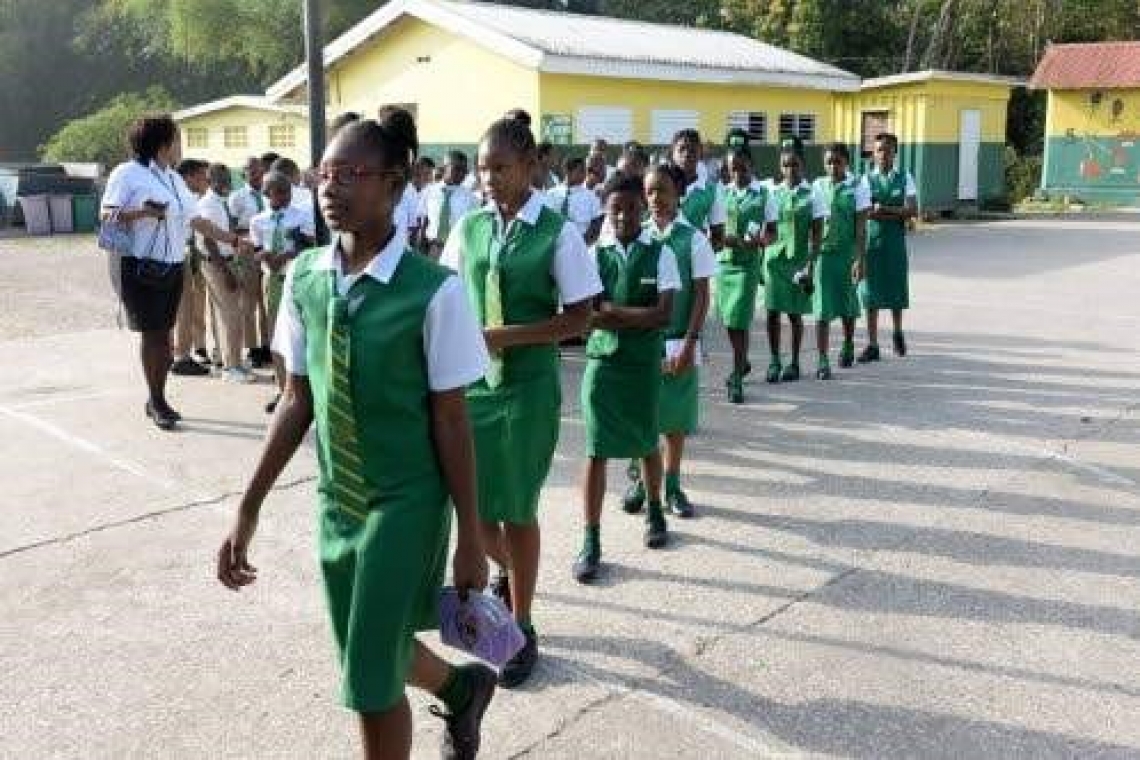Jamaican students in the school yard. File photo taken before the COVID-19 pandemic.
KINGSTON, Jamaica--The Ministry of Education has increased the amount of money granted to schools this year to facilitate the range of measures required to operate safely once they reopen in September.
Consistent with measures being employed since the start of the coronavirus outbreak, the requirements for schools include hand-washing and -sanitising stations, mask-wearing and physical distancing, but they also feature reduced class sizes and hiring additional teaching and ancillary staff.
At a virtual meeting with parents late Saturday evening, Acting Chief Education Officer Dr. Kasan Troupe said the ministry had requested an additional J $3.5 billion (US $ 24 million) from the Ministry of Finance.
The operations allocation for primary schools is J $4.4 billion (US $30.2 million), of which J $210 million (US $1.44 million) is slated for infrastructure improvement. Secondary schools are being provided with J $6.7 billion (US $46 million).
The ministry said the schools were to receive funds on Monday, July 27, meant for deep-cleaning and disinfecting and provision of hand-washing stations, cleaning agents and related resources. The amount for primary schools is J $500,000 each (US $3,433), while high schools are being allocated J $1 million (US $6,867) each.
With regard to staffing, the ministry said on Saturday that it is prepared to allocate additional funds to cover those needs.
“We will continue to provide staffing to schools, but schools have the option of receiving J $2 million to $20 million [US $13,734 to $137,340 – Ed.] depending on how many additional staff members they will require to implement the modified curriculum approach in light of the pandemic,” Dr. Troupe said.
Schools are scheduled to begin reopening on September 7. That first week will be dedicated to orienting students, one year-group per day, to the new safety measures and practices to be observed.
For the week of September 14-25, only upper school – grades 4-6 at the primary level, and grades 9-11 at the secondary level – students are to report to school. Lower school – grades 1-3, and 7-8, respectively, are to return beginning on September 28. Grades 12 and 13 are expected to return for face-to-face classes on October 26.
In a manual previously circulated to school administrators, the ministry laid out guidelines and approaches for the safe reopening of schools. The document listed a range of best practice approaches ranging from class sizes, to parent pick-up and drop-off, and advised schools to tailor their plans according to their specific set-up and situations.
The 160-page document includes chapters from the Ministry of Health and Wellness, Manpower and Maintenance Services Ltd, UNICEF and the International Labour Organization (ILO).
Under the classroom arrangements heading, the manual says principals should explore the use of rotation/extended day/modified versions of the shift system for teaching and learning as “there should be no more than 10 or 15 students in any given classroom based on its size.”
It also recommends incorporating more digital and online learning to reduce class sizes for core subjects; organising for core subjects to be done at school and non-core ones at home; exploring the development of partnerships with critical stakeholders to identify and access additional infrastructure/classroom space such as church halls, libraries, tents, etc.; and reducing physical education classes by 50 per cent.
Under scheduling, the education ministry proposes staggering school days “to two or three days per week with three to four lessons per day as applicable for the specific grade levels, and allowing students to work from home for the remaining days of the week.”
Assemblies, playtime, lunch time and drop-off and collection times are also to be staggered.
“Decide which activities should be delivered face-to-face or using a distance modality,” the ministry said.
“Timetables should be adjusted to reduce the incidence of students moving from classroom to classroom; instead, specialist teachers are to visit the homerooms. Allow for five-minute breaks between lab sessions to allow for sanitisation before new groups enter.”
Saturday’s meeting was the first of seven the ministry has scheduled to keep parents abreast of the changes before September. The next one is set for tonight, July 28, at 6:30. ~ Jamaica Observer ~







